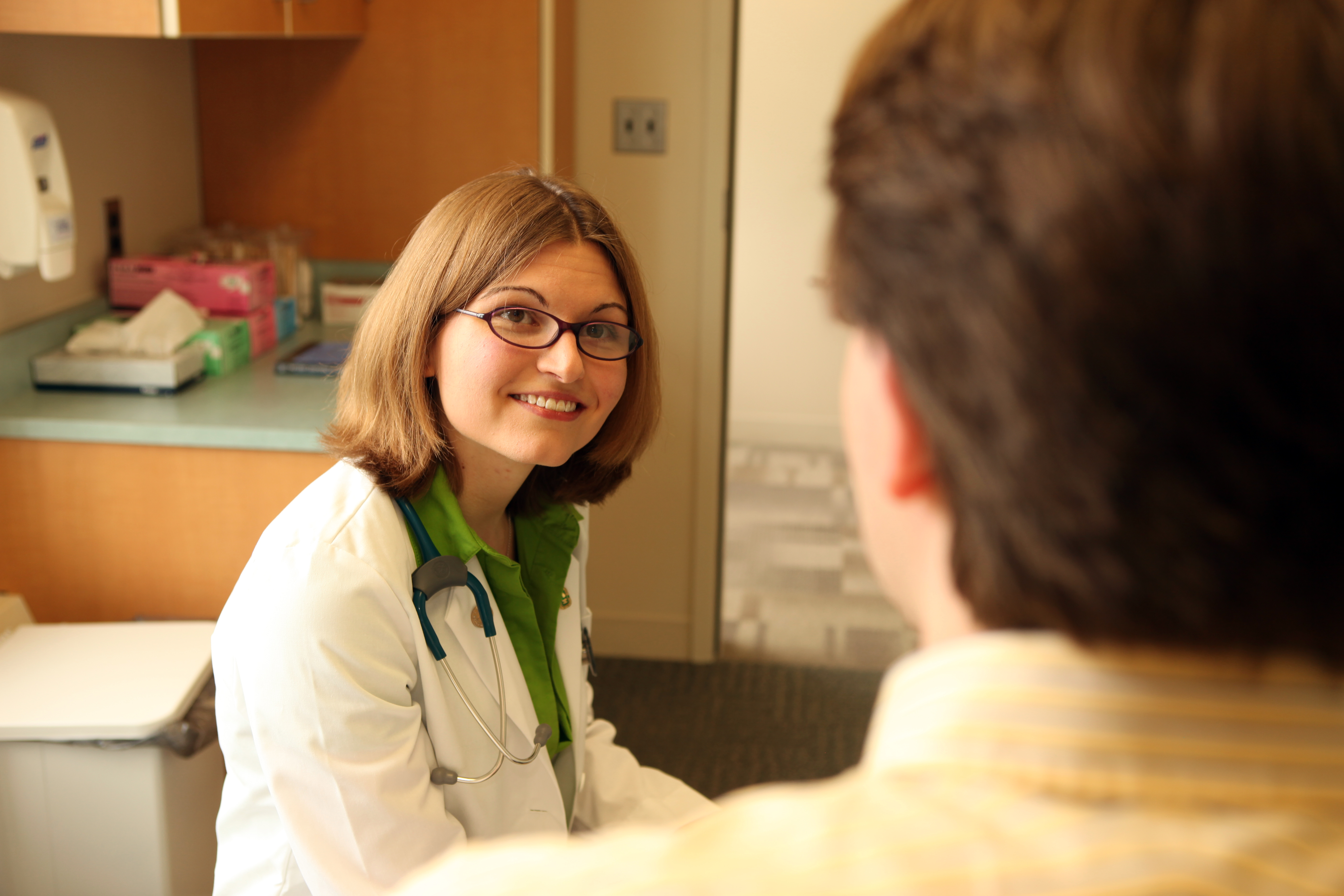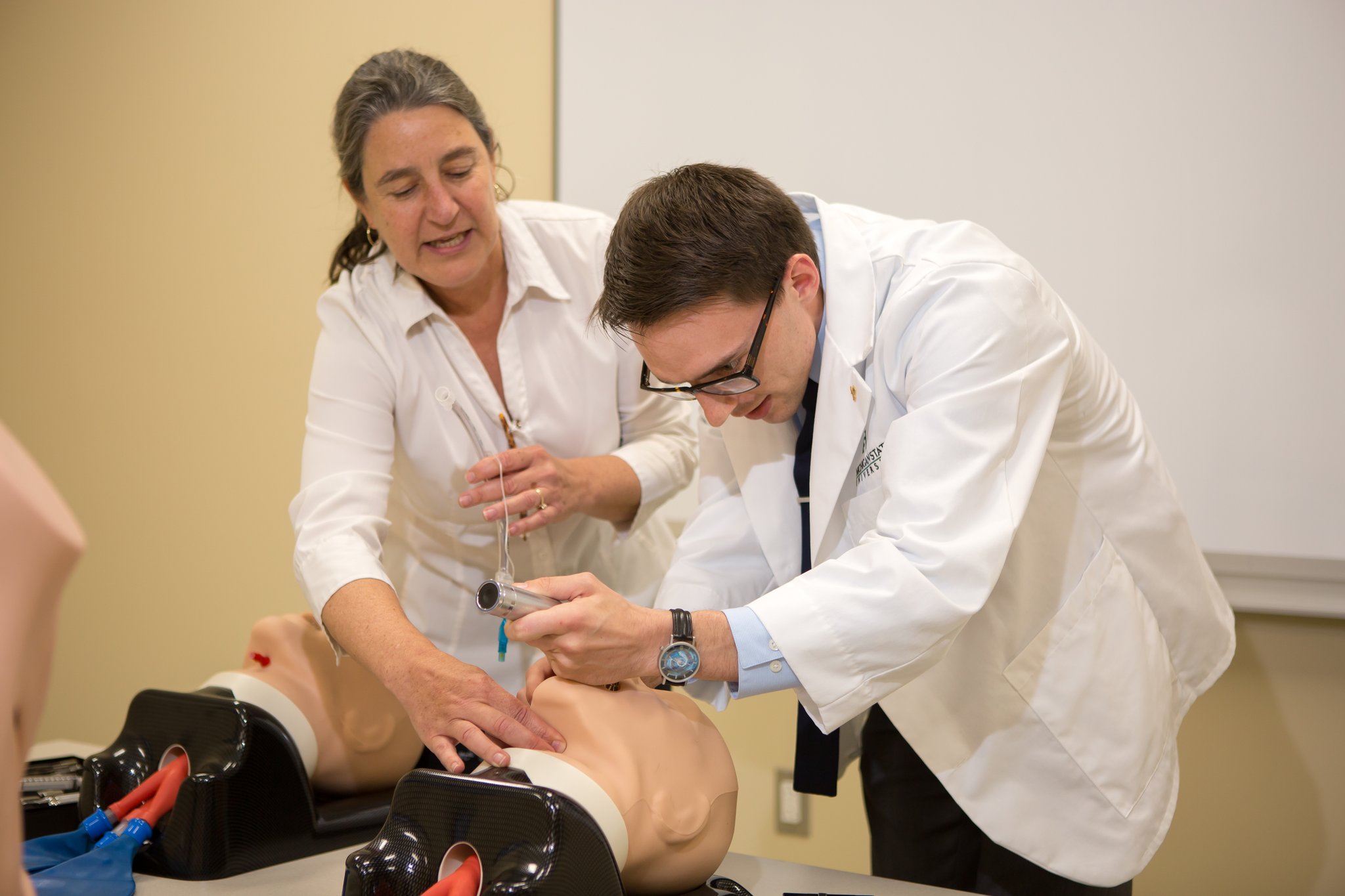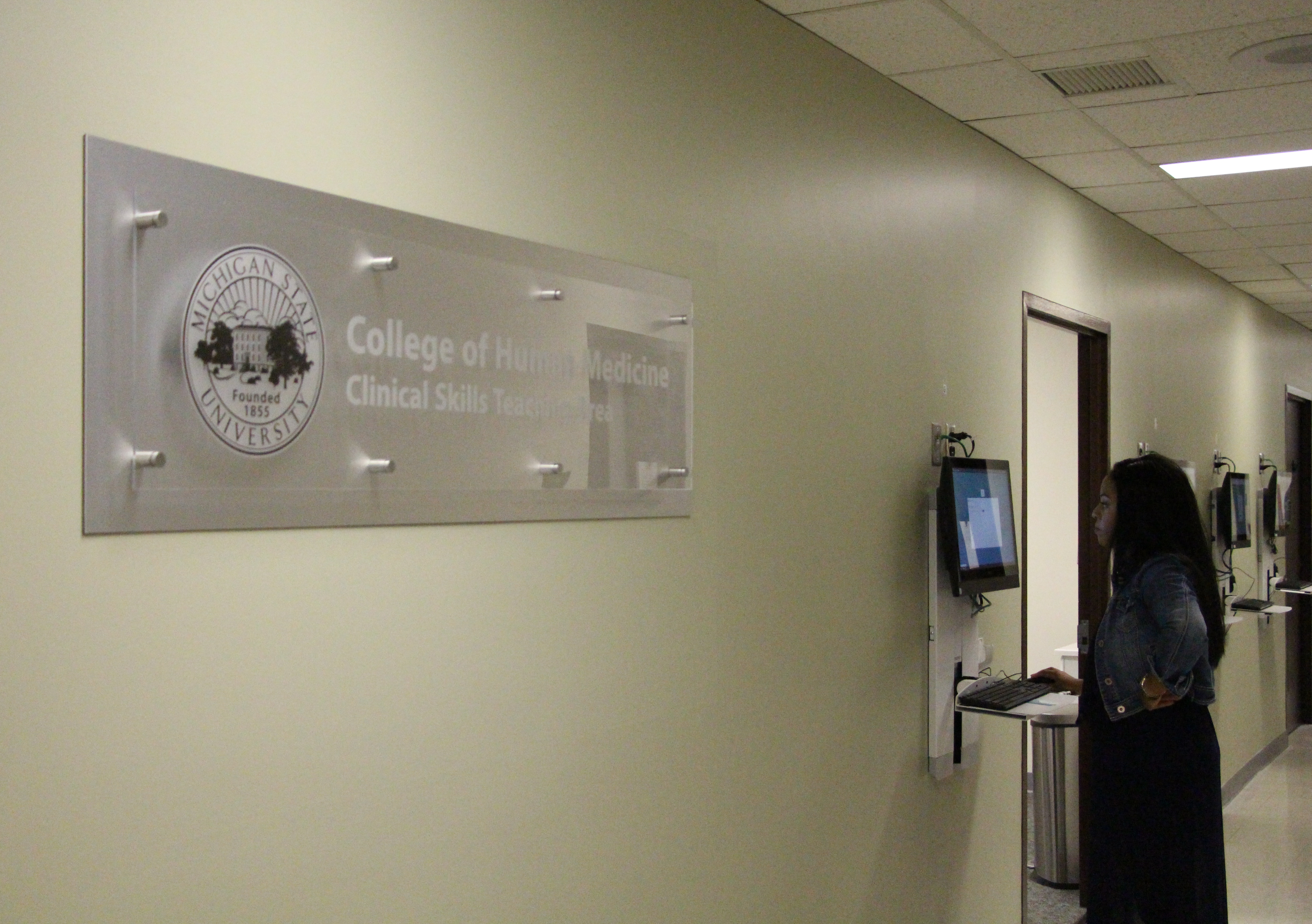Shared Discovery Curriculum Highlights
Michigan State University College of Human Medicine stands at the forefront of national efforts to improve the medical school experience in response to changes in the landscape of health care, advances in medical knowledge, and new understanding about lifelong learning and competency-based assessment. It's who we are. CHM does not only have a strong tradition of excellence in improving health care, the college is a pioneer in community-based medicine with a legacy of innovative responses to educational imperatives.
The Shared Discovery Curriculum is the next chapter in that legacy. While medical schools may similarly utilize one or a few facets of Shared Discovery, none is modernizing medical education at this scope. Here are several highlights from the curriculum that make CHM a special place to be:
Early and Ongoing Clinical Experiences

Students at the College of Human Medicine learn by doing and are introduced to clinics within weeks, engaging with patients much earlier than traditional medical school curricula. The 24-week Early Clinical Experience (ECE) places students in ambulatory settings, learning with medical assistants, nurses and physicians to contribute to actual health teams. Post-clinic debriefings pair what students experience in the clinic with the medical sciences, increasing competency and ensuring true learning. This integrated format of longitudinal education and comprehensive training secures that, after four years, students are well-prepared and can hit the ground running in residency.
Think Like a Doc with Chief Complaints and Concerns
The Shared Discovery Curriculum is competency-based and patient-centered rather than discipline-centered, system-centered or disease-centered. This fully-integrated curriculum mimics how doctors function in the real world. Chief Complaints and Concerns are organized by the most common complaints or presenting conditions and divided into 220 objectives for the students to complete. The Post Clinic Groups that take place after each clinical half day spend some time debriefing what was seen and done in that clinic, and then accomplish the necessary science teaching related to the topic of the week.
Students start with the "end in mind." A typical patient isn't going to come into the clinic and tell the physician that something is wrong with their physiology. Instead, they'll tell the physician that there is pain in the legs or discomfort in the chest, for instance. So using the Early Clinical Experience (ECE) as an example, students learn to room patients. As they take vital signs, obtain pain scores, do diabetic foot exams, and give immunizations, the Chief Complaints and Concerns topics that are programmed into each week of the ECE teach the clinical and necessary science material related to blood pressure regulation, respiratory physiology, neural pathways for pain and autonomic control, vascular structures and sequelae of blood sugar elevation, and the rationale and immunology of immunization schedules, as well as the anatomy of where the immunizing needle goes. Chief complaints and concerns define the end-competencies of the educational program utilizing an integrative framework centered on what happens in the workplace, ensuring learning moves from memorization to internalization.
Building a Portfolio You Can Use
The Portfolio is an aggregation of materials that demonstrate the ongoing participation and development of the student. All artifacts and assessments within the Portfolio align with SCRIPT competency goals. Some of the materials/artifacts are generated by participation in activities or completion of assignments based on the curricular component and topic. Portfolios of evidence containing essays, videos, reflections, scholarly products and projects are reviewed at regular intervals by Learning Society Fellows. These reviews assure acquisition of the necessary knowledge, skills and attitudes, and that learners receive anticipatory guidance to achieve not only competence, but excellence. Examples include:
- Direct Observation
- Clinical Documentation
- Logbooks
- Skill Certification
- External Examinations
- Formative Assessments
- Activities Supporting Academic Certificate Achievement
- Additional Artifacts
Opportunities to obtain specialized knowledge and skills pertinent to medical training exist outside of the College. Two are required:
- Current Basic Life Support (BLS) certification by the American Heart Association is required at the time of matriculation and must be maintained throughout enrollment.
- Michigan State University Institutional Review Board certification for researchers is required prior to graduation and any participation in any human subjects research.
Upon graduation, students will have a portfolio full of competencies that they can confidently show to residency administrators—the college has officially verified those abilities and skills. College of Human Medicine graduates are known for being well-prepared for the transition to residency and the portfolio assists in giving CHM students a leg up in the match process. It's one of the reasons Spartan MD's are able to match to some of the most competitive residency programs across the nation.
Progress Testing: Fewer Tests, Less Pressure
Progress testing is a longitudinal competency assessment that facilitates adult learning. Students succeed by participating in the curriculum and seriously monitoring progress, not constantly binge-studying and then forgetting everything. From the first weeks of medical school and at regular intervals throughout the curriculum, a suite of progress assessments enables students and their faculty to verify the achievement of competence and readiness to move through the curriculum.
So while the constant feedback and coaching from faculty is constant, students undergo a formal test only twice a semester. This comprehensive examination, mapped to the USMLE Step examination blueprints, assures students and faculty that they are mastering the necessary material to the necessary depth for success on these licensure examinations and for an intellectually satisfying trajectory through the curriculum. In essence, the College of Human Medicine Progress Suite of Assessments is the graduation test for the MD degree, measuring the entire body of knowledge that a student should master by the end of medical school. Rather than aiming for mastery of a small amount of knowledge, progress testing assesses incremental improvement in student performance over an extended period of time.
Strong Collaborative Support from Mentors and Peers

The Academy and Learning Societies provide structure for small group learning, educator development, and full support while strengthening the learner/educator dynamic. Fostering trusting relationships and a rich collegial environment for students and fellows, this set-up facilitates ongoing mentoring and scholarly collaboration. It is a more personalized medical education and encourages an environment of shared discovery for students and educators...together. The Academy, with its composition of students, basic and social scientists, and physicians, anchors our educational enterprise. This administrative structure enables students to interact with educators in a variety of settings over multiple years.
Technology-Enhanced Curriculum and Assessment
The Shared Discovery Curriculum embraces the digital age with technological advancements for both patients as well as students. Created here at the College of Human Medicine, JustInTime Medicine is the cloud-based curricular/assessment software with device-friendly capabilities driving the curriculum without need for physical textbooks. Using a simple web-based authoring tool, faculty can easily build and update customizable educational content for distribution to both desktop computers and internet-enabled mobile devices from a single interface. All content can be enhanced by expanded explanations, hyperlinks to peer-reviewed references, tables, images and sound files.
Ample Customizable Experiences
Experiences for CHM students can vary depending on factors like research opportunites, admittance to dual degree or certificate programs, as well as community campus placement. But another factor that allows students the opportunity to customize their personal experience is through Intersessions, which occur in two periods between clinical experiences. There are three categories of intersessions including specialized intersessions, which are focused on in-depth exploration of specialized topics. These advanced intersessions allow students the ability to pursue personal interests and strengths.
In addition, the Shared Discovery Curriculum combination of progress testing and experience-based education fuel individual learning plans, so that students can achieve their full potential. Because students do so much clinical work in the Early and Middle Clinical Experiences, elective clerkships will be available early in the Late Clinical Experience. Students at CHM have used these electives to not only dive deeper into particular specialties, but also see health care programs across the US and globe. At the College of Human Medicine, the sky is the limit.


